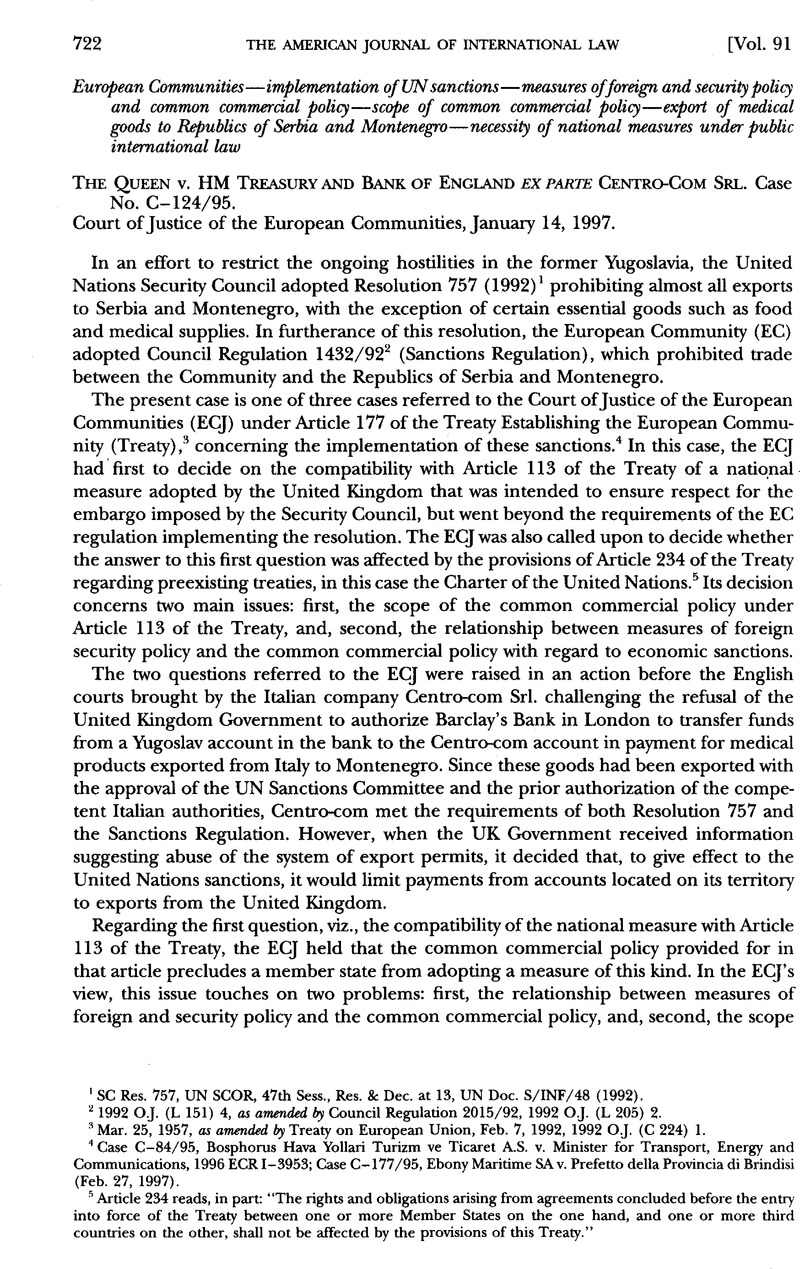Published online by Cambridge University Press: 27 February 2017

1 SC Res. 757, UN SCOR, 47th Sess., Res. & Dec. at 13, UN Doc. S/INF/48 (1992).
2 1992 O.J. (L 151) 4, as amended by Council Regulation 2015/92, 1992 O.J. (L 205) 2.
3 Mar. 25, 1957, as amended by Treaty on European Union, Feb. 7, 1992, 1992 O.J. (C 224) 1.
4 Case C-84/95, Bosphorus Hava Yollari Turizm ve Ticaret A.S. v. Minister for Transport, Energy and Communications, 1996 ECR1-3953; Case C-177/95, Ebony Maritime SA v. Prefetto della Provincia di Brindisi (Feb. 27, 1997).
5 Article 234 reads, in part: “The rights and obligations arising from agreements concluded before the entry into force of the Treaty between one or more Member States on the one hand, and one or more third countries on the other, shall not be affected by the provisions of this Treaty.”
6 Case C-70/94, Fritz Werner Industrieaüsrustungen GmbH v. Federal Republic of Germany, 1995 ECRI- 3189, para. 10. See also on this case, Juliane Kokott & Beate Rudolf, Case note, 90 AJIL 286 (1996).
7 1969 OJ. 590 (Eng. spec. ed. 2), as amended by Council Regulation 3918/91, 1991 O.J. (L 372) 31.
8 Id., Article 1 reads: “The exportation of products from the European Economic Community to third countries shall be free, that is to say, they shall not be subject to any quantitative restriction, with the exception of those restrictions which are applied in conformity with the provisions of this Regulation.”
9 Werner, 1995 ECR I-3189, para. 22; Case C-83/94, Criminal Proceedings against Leifer, 1995 ECR I - 3231, para. 23; Kokott & Rudolf, supra note 6, at 288 (also discussing Leifer).
10 Article 11 reads:
Without prejudice to other Community provisions, this Regulation shall not preclude the adoption or application by a Member State of quantitative restrictions on exports on grounds of public morality, public policy or public security; the protection of health and life of humans, animals or plants; the protection of national treasures possessing artistic, historic, or archaeological value or the protection of industrial and commercial property.
Regulation 2603/69, supra note 7.
11 Werner, 1995 ECR I-3189, paras. 25 and 27; Leifer, 1995 ECR I-3231, paras. 26 and 28; see also Kokott & Rudolf, supra note 6, at 289.
12 1981 O.J. (L 144) 1.
13 Leifer, 1995 ECR I-3231, para. 33.
14 Opinion of Advocate General Jacobs, para. 46 (Sept. 24, 1996) [hereinafter Jacobs Opinion].
15 Opinion 1/78, 1979 ECR 2871, para. 45, confirmed by Opinion 1/94, 1994 ECR I-5267, para. 31; Werner, 1995 ECR I-3189, para. 9; see also Kokott & Rudolf, supra note 6.
16 Werner, 1995 ECR I-3189, para. 22; Leifer, 1995 ECR I-3231, para. 23.
17 See Kokott & Rudolf, supra note 6, at 288.
18 See generally Torsten, Stein, Außenpolitisch motivierte (Wirtschafts-) Sanktionen der Europäischen Union—nach wie vor eine rechtliche Grauzone? , in Recht Zwischen Umbruch und Bewahrung: Völkerrecht, Europarecht, Staatsrecht: Festschrift Für Rudolf Bernhardt 1129, 1135 (Ulrich, Beyerlin et al. eds., 1995)Google Scholar; Meinhard, Schroder, Wirtschaftssanktionen der Europäischen Gemeinschafien gegenüber Drittstaaten , 23 German Y.B. Int’l L. I 111, 112 (1980)Google Scholar; see also Treaty, Art. 224 (presuming the member states’ competence).
19 See Sebastian, Bohr, Sanctions by the United Nations Security Council and the European Community , 4 Eur. J. Int’l L. 256, 268 (1993)Google Scholar.
20 Article 228a reads:
Where it is provided, in a common position or a joint action adopted according to the provisions of the Treaty on European Union relating to die common foreign and security policy, for an action by the Community to interrupt or to reduce, in part or completely, economic relations with one or more third countries, the Council shall take the necessary urgent measures. The Council shall act by a qualified majority on a proposal from die Commission.
Article 73g reads:
1. If, in die cases envisaged in Article 228a, action by the Community is deemed necessary, the Council may, in accordance with the procedure provided for in Article 228a, take the necessary urgent measures on the movement of capital and on payments as regards the third countries concerned.
2. Without prejudice to Article 224 and as long as the Council has not taken measures pursuant to paragraph 1, a Member State may, for serious political reasons and on grounds of urgency, take unilateral measures against a third country with regard to capital movements and payments. The Commission and the other Member States shall be informed of such measures by the date of their entry into force at the latest.
The Council may, acting by a qualified majority on a proposal from the Commission, decide that the Member State concerned shall amend or abolish such measures. The President of the Council shall inform the European Parliament of any such decision taken by the Council.
21 See Christoph, Thun-Hohenstein, Handelsbeschränkungen durch UN-Beschlüsse und Ratsbeschlüsse im Rahmen der Gemeinsamen Außen- und Sicherheitspohtik, ihre Wirkungen für die EG und Österreich , 1996 Zeitschrift Für Rechtsveroleichung, Internationales Privatrecht Und Europarecht 238, 240 Google Scholar; Jacobs Opinion, supra note 14, para. 42.
22 Jacobs Opinion, supra note 14, para. 42.